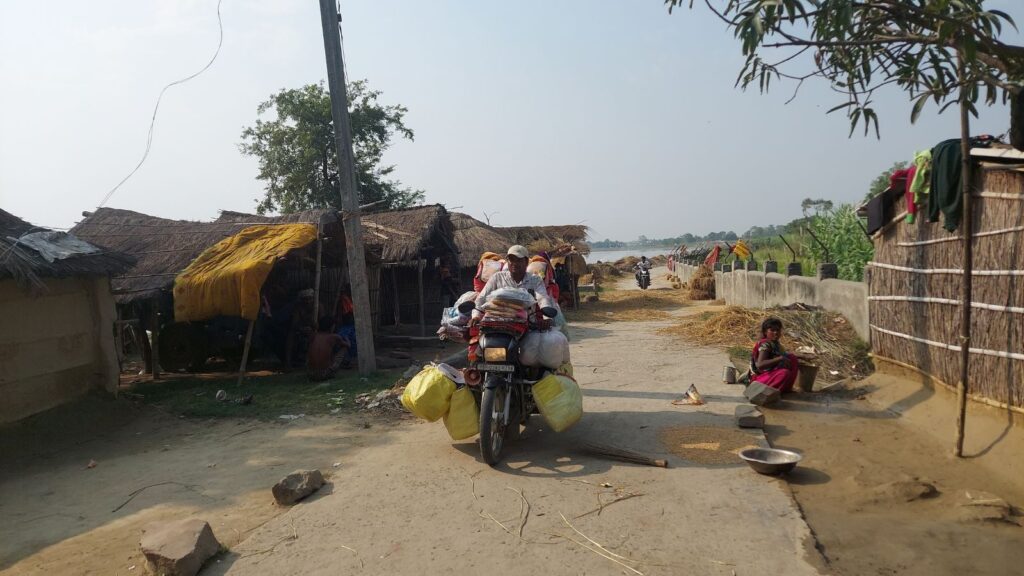In Rewa village, on the banks of the Budhi Gandak river in Muzaffarpur, 35-year-old Lallan Sahani and his friends sit outside his house, discussing how Chief Minister Nitish Kumar’s prohibition policy has “wreaked havoc” across Bihar.
“Nitish Kumar has done good work during his tenure. This (prohibition) is the only mistake he has made. Liquor is still available, just more expensive. And those who drink end up in jail. Only the poor suffer,” says Sahani, as his friends nod in agreement.
Listening from behind the door, 50-year-old Asha Devi storms out of the house. “All you men want is to drink and get wasted. You will be beaten up now—get lost!” she scolds. “Nitish Kumar has done the right thing. Men come home drunk and shout ‘khana de’. After drinking, my husband talks of buying buffaloes; by morning, he can’t afford a goat.”
At Hussainganj in Siwan, YouTuber Munna Matlabi faces similar rebukes from his wife when he suggests that prohibition should be lifted.
Across Bihar, prohibition appears to have split opinion sharply along gender lines. While men across caste groups want the liquor ban lifted, women overwhelmingly back it. This divide—combined with a raft of welfare schemes meant for women—seems to have become one of the key factors defining Nitish Kumar’s campaign in this Bihar election.
 Bihar’s prohibition policy, enforced since 2016, continues to be among the state’s most polarising issues. (Express Photo by Deeptiman Tiwary)
Bihar’s prohibition policy, enforced since 2016, continues to be among the state’s most polarising issues. (Express Photo by Deeptiman Tiwary)
Near the village well in Rewa, four women discuss this very issue. “What Nitish ji has done is good, but the ban should be total. Even illegal country liquor should not be available,” says Pushpa Devi. Sunita Devi nods: “It’s still better than before. Earlier men would get drunk, wander the roads and die in accidents. Their families suffered for life.”
Bihar’s prohibition policy, enforced since 2016, continues to be among the state’s most polarising issues.
Socially, it has brought visible changes in many rural households—curbing domestic violence, improving household finances and earning Nitish the goodwill of women who credit him for restoring “ghar ki shanti”.
Politically, though, prohibition has become a double-edged sword: women back it, but rampant smuggling and police misuse have eroded its moral appeal. Economically, the state has lost thousands of crores in excise revenue and has seen the flourishing of a parallel black market.
The issue has also divided the political landscape. While the JD(U) defends prohibition as a moral reform, parties like the CPI(ML)L and Prashant Kishor’s Jan Suraaj have declared they would lift the ban if voted to power.
In Basudeva village of Gopalganj’s Bhorey constituency, Shivshankar and Mukesh Chauhan, both from the Nonia EBC caste, echo the resentment voiced by a large section of men.
 The issue has also divided the political landscape. (Express Photo by Deeptiman Tiwary)
The issue has also divided the political landscape. (Express Photo by Deeptiman Tiwary)
“Everything else Nitish has done is good—roads, power, all of it. Only prohibition is the problem. Jails are full of poor people. If you want to control drinking, give permits so people can buy legally,” says Shivshankar.
But in the same village, Sumitra Devi and Puja Devi see the alcohol ban as a blessing. “Those who drink still manage to find liquor. Yet, it’s the best decision Nitish took. Household quarrels have reduced, and the younger generation isn’t picking up the habit. If there were shops in the village, who would stop them? At least now there’s fear of the law,” they say.
At Musahar Tola in West Champaran’s Poor House, Chhattu Ram’s response is laced with sarcasm. Asked what benefits he has received from the government, he replies, “A lot. The biggest one is that liquor once sold for Rs 25 now costs Rs 200. That’s development.” Then, turning serious, he adds, “We need our drink—we just don’t want to go to jail for it. Any government that comes next should fix this.”
In the same village, Kalita Devi has other worries. She hasn’t yet received the Rs 10,000 dole given under the Mukhyamantri Mahila Rozgar Yojana (MMRY) just before the announcement of the polls. “I don’t drink, so prohibition doesn’t matter to me,” she says. “Those who do, die in hooch tragedies.”
That’s exactly what troubles Golu Kumar, a shopkeeper in Siwan’s Anand. “It’s easy for Nitish Kumar to say those who drink will die, but the government must take responsibility for hooch deaths. People pay more now, and the only ones who benefit are the smugglers and police,” he says.
As Bihar votes, prohibition remains one of the most emotionally charged issues in the state—dividing not just parties and castes but also families.

